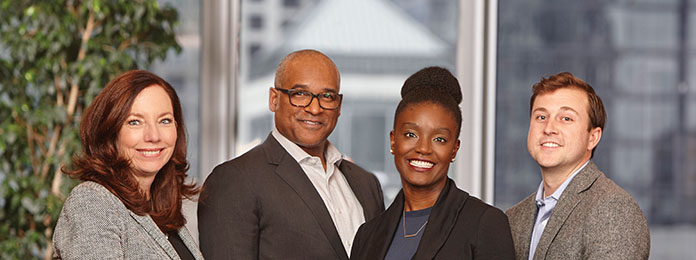While America is considered the ultimate melting pot, many companies have yet to capitalize on the value of this model. Diversity in the workplace holds benefit for teams, partners, stakeholders—and the bottom line.
A 2015 McKinsey report on 366 public companies found that those with management in the top quartile for ethnic and racial diversity were 35 percent more likely to yield financial returns above their industry mean, and those in the top quartile for gender diversity were 15 percent more likely to show returns above the industry mean.
Working side by side with colleagues from different backgrounds, experiences and cultures challenges us all to think outside the box and look at things from new perspectives. This is especially evident in the multifamily real estate industry, which can span from affordable housing to luxury rental towers and condominiums. I know firsthand that at The Habitat Company, not only do we appreciate and embrace the many ways diversity brings positive influence to business, but it’s also built into our office culture.
What is diversity?
Diversity is defined as the inclusion of individuals representing more than one national origin, color, religion or socioeconomic level. But what does that mean in the real world? We can look at numbers on paper and know that women make up 80 percent of Habitat’s current regional managers and 42 percent of our operations staff. We know that a large percentage of our team members are Gen X, with baby boomers and millennials comprising the balance. Why does this matter? And does that make us diverse?
Diversity in the workplace is much more than how we look and from where we came. It offers different perspectives based on an individual’s experiences, not just their race or socioeconomic class.
As a developer and property manager with a national portfolio of more than 22,000 units, it’s imperative that our team is as diverse as our residents. We turn to our colleagues because their diversity—from the languages they speak to the experiences they’ve had—benefit our residents, office environment and bottom line.
To learn what associates bring to the table, you must make it a priority to get to know one another. For our firm with over 800 staff spread across multiple locations including experts in development, management, finance, law, marketing, architecture and engineering, it can be a challenge.
One way we do that is through regularly scheduled happy hours at our corporate office. For each one, a different department organizes the event choosing a theme that speaks to them. From wine tasting to Jamaican cuisine, these events allow us a few moments to get to know each other beyond our daily responsibilities.
Diversity is an asset
First and foremost, our business is providing a great living experience for people. The brick-and-mortar properties we develop and manage are where people live—and also happen to be physical assets. Our job is to engage, communicate and ultimately fill those assets with residents. If we fall short of this goal, we lose financially, as do the owners and investors of that asset. It is incumbent upon us to engage and connect personally, on a real level with the people who call those buildings home. Our success is measured by keeping buildings leased, and residents happy.
This is why a diverse team is also an asset. It equips us to better relate to the diverse populations that live in the buildings we manage. Linguistic diversity is as common as ethnic or socioeconomic diversity. Property owners rely on us for the expertise, experience and diversity to meet this need.
For example—we manage a property for the Chicago Housing Authority (CHA). This 450-unit building is home to residents from across the globe—from Slavic countries and the Middle East to Central and South America and the Caribbean.
By ensuring the on-site property manager spoke Russian—and that other personnel were also multi-lingual—we could ensure the majority of residents had someone on staff to communicate with in their native language. This can be a huge comfort for people who are getting acclimated to living in a new country. When property managers align culturally with the residents, it strengthens their bond, potentially ensuring a long-term relationship, which is good for the company’s bottom line.
When a firm’s leadership team is like Habitat’s in that it spans generations, race and gender, it tells a lot about its culture and helps build respect and ultimately, business, within the community.
It’s not just about leadership, it’s also about the people working hard at their jobs every day and understanding what makes them special. Tapping someone for knowledge beyond their job gives them greater purpose. It could also help you grow business in a new direction or neighborhood. And, those team members will know they are valued and appreciated at even deeper levels.
Watch diversity inspire others
Diversity can inspire us to do better and learn more. It impacts our business decisions, our interactions with one another and provides variety in the perspectives people share and discuss. It encourages us to be open minded to new ways of thinking and acting as we are challenged to understand something that isn’t part of our own background.
In the multifamily business—especially property management—working with different populations will always present interesting situations. It can be very hard for residents of different backgrounds to understand someone else’s culture. This is where the diversity within your company can help solve some of these challenges. While the team members closest to the problem may not understand the issue, another associate might be able to shed light from a different perspective. Turning to colleagues for their expertise or outside knowledge can provide inspiration to manage future issues.
Diverse workforces are the new normal for Gen Z
Does diversity matter to up-and-coming members of the workforce? I think it does. The next generation lives in a very global time. They are progressive thinkers who take their careers seriously and likewise wish to work for companies that offer diversity, meeting the needs of the global lifestyles to which they’re familiar.
They’re not necessarily looking for diversity in ethnicity or socioeconomic status, but in linguistics, age and thought. A diverse world is their normal. I challenge you to think about how your company will measure up in the eyes of potential employees.

Author: Charlton Hamer, SVP Habitat Affordable Group
















